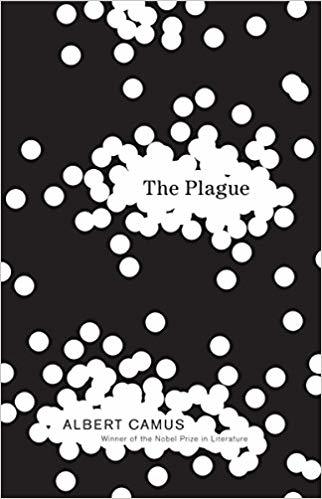If there is one thing to do to pass one’s time isolated during plague, it’s writing. Writing is merely the act of the controlled trembling of one’s hands. No one can tell your if hands are shaking or not. You have to keep moving in place. The anxiety and fear of becoming infected, of the social state of one’s surroundings, of the present and future. If you keep writing, then it’s something to do, a way to keep busy. It’s a kind of controlled pacing back and forth that hides bad handwriting or a need for spellchecking. And there’s the unexpected amount of time available.
What is it about plague that compels us to write about it? Albert Camus’ The Plague, Thomas Mann’s Death in Venice, Station Eleven by Emily St. John Mendel, Gabriel Garcia Marquez’s Love in the Time of Cholera, Homer’s Iliad, Thucydides’ Peloponnesian War, The Book of Exodus, Daniel Defoe’s Journal of a Plague Year. So much literature about such testing times, when the character of individuals and society is laid bare.
There is something unique and concretizing about an invisible, inhuman threat that forces us to consider our humanity and society in explicit ways. It’s not just because our mortality is more noticeable. It’s that our choices to be human and act humanely are all the more required. Who are we? How shall we act? How do we understand this?
Passover is coming and we will read the Ten Plagues in Exodus with fresh eyes. I can’t remember any other plagues in the Hebrew Bible, though I’m sure there are. It’s easier to point to the Psalms, Job, Ecclesiastes, and Lamentations (all poems, by the way) for not feeling alone in times of suffering. I don’t think even The Book of Revelation has an actual plague. How do we translate for now what was written then? We still adjust our eyes to our new, freshly disinfected lenses.
Now, there’s a flurry of online documentation and reflection, from Coronavirus Diary at The American Conservative to The Point‘s Quarantine Journal to countless personal Twitter and Facebook dispatches. We have to write about it. I have to write about it. We have to get it out of us. It’s a balm and relief to write.
My suffering city shudders and coughs and I do not risk going outside. I’ve not left the house in days. Our nation’s president has abandoned New York City out of petulant spite. I feel helpless, yet the most active thing I can do is stay at home, to act like I am infected to prevent others from getting infected. I worry and grieve for the poor, the first-responders, the medical professionals who are at highest risk for contagion.
The humanities have been pilloried and starved these last few decades and in the name of partisan economics and ideology have been stripped of their status and support. But in this time of plague it is the arts and humanities that must convey and translate the unspeakable horror we are experiencing. This includes good, honest, solid religious writing.
We cannot endure any longer evangelical magical thinking or pastoral bromides or the insipid bibliomancy of proof-texting. The insufficiency and weakness of that writing will fall like chaff if we meet it with solid biblical exegesis, theological hermeneutics, and humble observation. We need religious writing that embraces the complexities and unknowability and doubt that we are experiencing. If we are to write about faith and God and action and community, then we require an honesty and truth in our writers and their writings against so many lies and propaganda and escapist dogmatism.
It is an awful time to be a writer. The times are truly awful and they are getting worse. And in our homes we can write and we can spend time to write well. We can offer comfort and meaning. We can offer fictive escape. In our isolation, we can offer something shared.
At the very least, we can keep ourselves distracted – if only for a short while – with the tapping of keyboards and the whispering of pens as we put our hearts and minds and souls on the page with shaking hands.
What are you writing? How do you do it?

Discover more from Bleak Theology
Subscribe to get the latest posts sent to your email.






I’m journaling and writing poetry, like always. But not about this. This is still too unreal. And too proximate. I can’t get the distance yet to say anything–nor is it acutely close enough yet to terrify me. It is a humming in the background giving me a headache, not a siren in my ear causing me to panic.